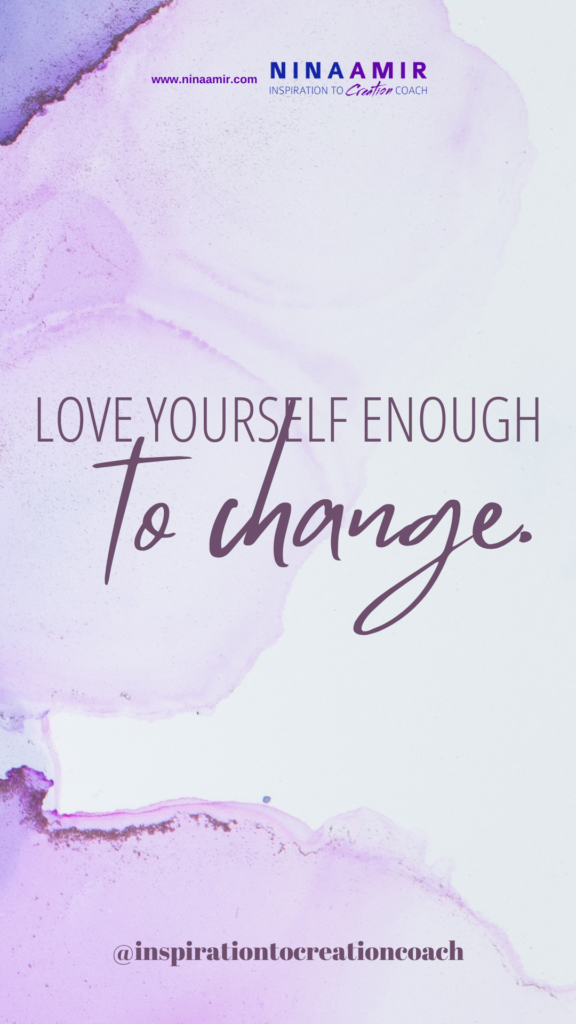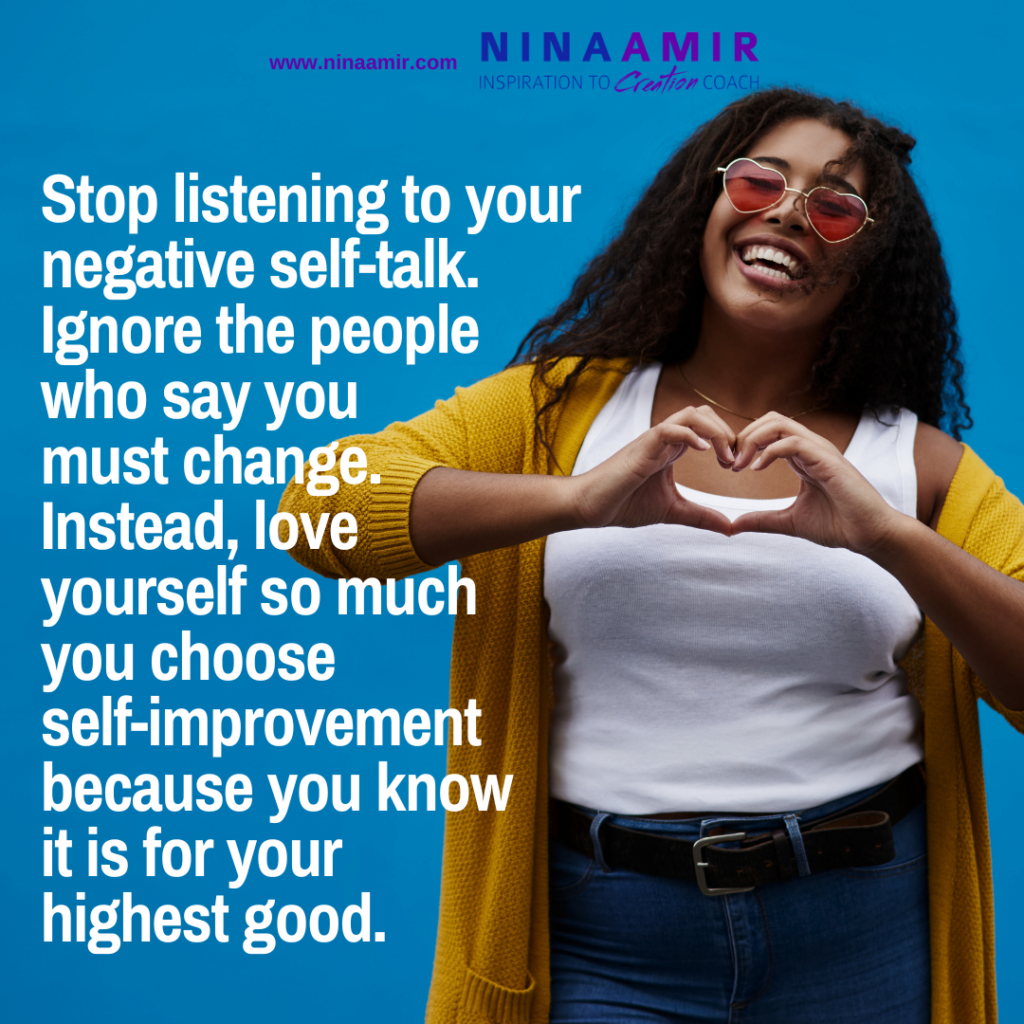It’s time to approach self-improvement from a positive viewpoint. Love and accept yourself enough to change. Don’t shame and criticize yourself into transformation.
I’ve been involved in self-improvement since I was in my late 20s. Some call this self-growth or self-development. Whatever name you use, we are talking about personal change. And that’s a good thing.
As spiritual beings having a physical experience, we are here to learn, grow, change, and expand. Doing so causes both personal and spiritual growth. And we can accomplish that goal by supporting, loving, and accepting ourselves rather than constantly beating ourselves up for not achieving our potential or creating the lives we desire.
If that sounds counterintuitive, let me explain.
Forced Self-Improvement Doesn’t Stick
Typically, people feel forced to change. For instance, your mental chatter revolves around everything you don’t do or do wrong. Your brain constantly reminds you that you aren’t good enough, are likely to fail, or aren’t worthy.
So…you feel you must change, even if you don’t want to.
Or people in your life intimate something similar. Maybe your partner complains that you never listen, aren’t supportive, or leave dirty dishes in the sink. Perhaps your boss chastises you for not meeting deadlines, speaking to coworkers angrily, or showing up late too often. Or your friend says you aren’t supportive and…need to change.
You take their words to heart and feel it’s necessary to change to please them.
Maybe your mom says, “You won’t be able to do that.” Or “You never were good at ___, why would you think you could be good at it now?”
Her words make you feel horrible about yourself, and you decide to prove her wrong to feel better.
And so, all this negative feedback makes you believe you need to…should…must…change. And you decide to make an attempt at transformation.
The problem is that you decide to change from a place of negativity and lack of self-love or acceptance. You also do it for extrinsic reward—so people will love and accept you.
That kind of change is hard to make and rarely sticks.
A Gentler, Kinder Way to Change
What if there were a gentler, kinder way to decide to change…and one more likely to produce lasting results—true transformation? There is.
Let go of self-judgment and self-criticism. Stop the negative mental chatter, and replace it with words of self-love and acceptance.
 You might wonder how being okay with who you are now will make you feel the necessity to change. After all, negativity, criticism, and judgment—from yourself and others—motivate change, right?
You might wonder how being okay with who you are now will make you feel the necessity to change. After all, negativity, criticism, and judgment—from yourself and others—motivate change, right?
Yes, but as I said, that’s a broken strategy for creating lasting change. Admit it…it makes you feel pretty miserable about yourself, does it not?
A positive approach to self-improvement stems from loving and accepting yourself. From that perspective, you can choose to change because you love yourself enough to do so. You decide to change because you know it’s in your best interest.
When you make changes for intrinsic rewards—because you will enjoy changing in specific ways or reap the benefits of doing so—you will feel internally motivated to change. Therefore, you are more likely to carry through on actions required to accomplish change.
As a result, you will enjoy lasting change—transformation. Why? Because you want and appreciate the change, and it makes you love and accept yourself even more deeply.
The Positive Self-Improvement Formula
If you want to engage in positive self-improvement, here’s a simple formula. Each step gets you closer to the change you desire—not the change others desire.
1. Accept yourself. You can use this affirmation: I accept myself as I am.
2. Love yourself. I realize that can be easier said than done, but begin by telling yourself you love yourself. Look in the mirror daily and say, “I love you.” And be sure to read Love Yourself Like Your Life Depends On It by Kamal Ravikant.
3. Acknowledge that you want to change in a specific way because you love yourself. Love yourself enough to identify changes that will make you happier, healthier, more fulfilled, more connected, wealthier, able to fulfill your potential or purpose, or whatever you feel is in your best interest or for your highest good. Use this statement: *I love myself enough to acknowledge that changing ____, would be in my best interest and for my highest good.”
4. Uncover why you want to change. Attaching meaning to your desire to change in specific ways is essential. So, list how the change or changes will support your growth, learning, and expansion.
5. Decide how you will change. Get tactical. What do you need to do to accomplish the changes you desire? For example, do you need to create a new habit—if so, what habit and how will you develop it? If you need to learn something, how will you get that knowledge or skill?
This five-step formula provides a strategy for positive self-improvement. It doesn’t include even a hint of negativity. You won’t find yourself thinking, “I need or must change because something is wrong with me. ‘X’ is unacceptable to me or others, so I just change.”
Nope.
This formula is filled with gentle reminders of who you can be…who you know you want to be…if you change. It’s overflowing with self-love, acceptance, and kindness toward yourself while supporting your inherent desire to fulfill your potential during this human lifetime.
Let’s start a new self-improvement, self-growth, and self-development trend—a positive one. Let’s love ourselves all the way to transformation.
Have you created change with love and acceptance? Tell me in a comment below. And please share this post with a friend or on social media.
If you want to create transformation quickly so you can succeed, let’s chat. Get on my calendar here. Or join the Inspired Creator Community for group transformational coaching every month.
 It’s time to transform, is it not? Join the Inspired Creator Community. You probably already realize that you need to change from the inside out. That’s how you become a person who does the things that allow you to create your desires. As a member, you get access to intuitive transformational coaching, world-class personal growth coaching, and strategies for living a life that feeds your soul. And you will discover that you are a powerful creator able to create what you want (not what you don’t want). Join now!
It’s time to transform, is it not? Join the Inspired Creator Community. You probably already realize that you need to change from the inside out. That’s how you become a person who does the things that allow you to create your desires. As a member, you get access to intuitive transformational coaching, world-class personal growth coaching, and strategies for living a life that feeds your soul. And you will discover that you are a powerful creator able to create what you want (not what you don’t want). Join now!


